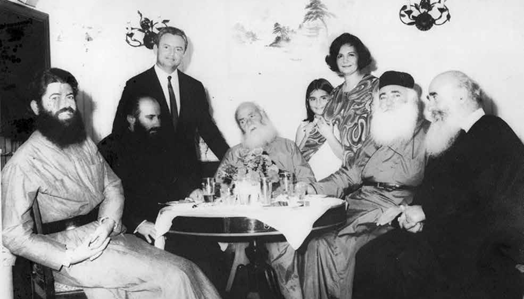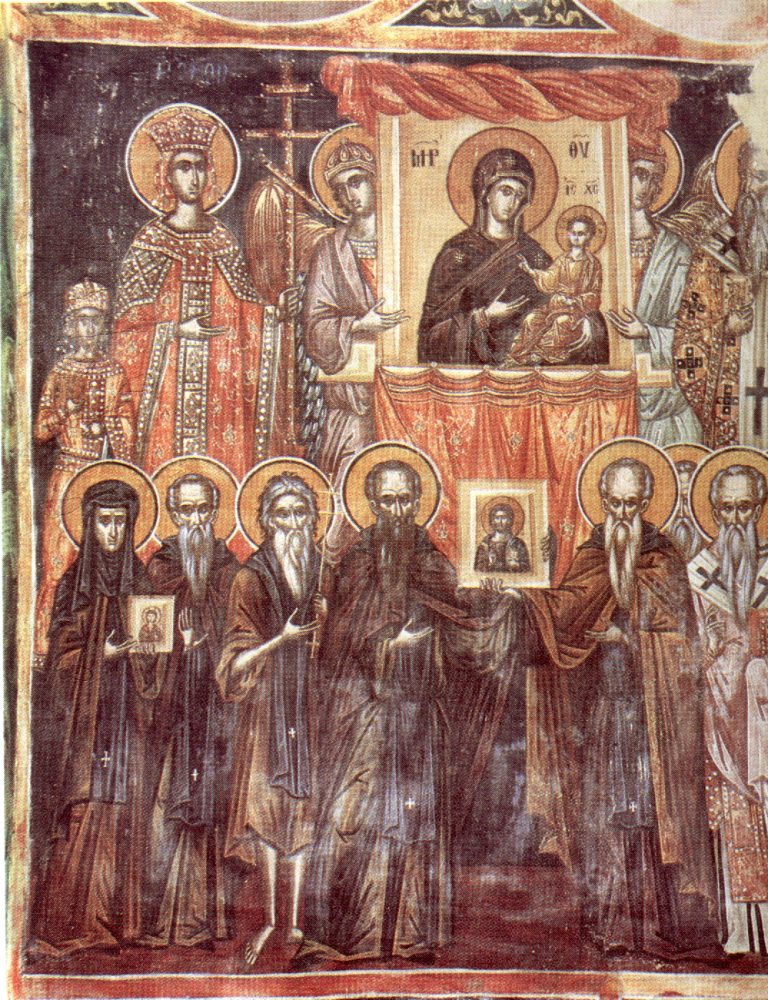The prophecies of the Crucifixion, missionary paraphernalia
Among the discourses that make up the book of the “Catechisms” of the Holy Apostle Cyril of Jerusalem, a special place is occupied – not by chance – by two “diamonds” of patristic literature, dedicated to prophecies. The first concerns the prophecies concerning the events of the crucifixion and the second those concerning the Resurrection of the Saviour. Following in the footsteps of the Saint, we too, in our turn, ought to demonstrate the value of prophecy – that ecumenical and permanent sign of our faith – to our brothers and sisters in need of catechesis. There is no doubt that prophecy plays an important role in the life of the Church and, by extension, in the life of each of us! It is a living miracle that has been given to us as an inheritance to study until the end of the world. I quote the words of Pascal, this pioneer scientist, who emphasized: “prophecies are enough for me to believe”[1]. St. Chrysostom pointed out that: “The prophecies chose those things that were to happen in the future so that people would not think that events happen simply and by chance, that is, as a result of nature or as an action of things, but that they happen according to the heavenly law and the decision of God, which helped people to know God.”[2] The prophecies were not to be taken as a means of knowing God. Knowing Him, they trusted Him, were fascinated by Him, loved Him and realized how much God loves man, since He has put in place a plan, the plan of the Divine Economy, to restore him – if He wills – to the lost paradise.
Taking our cue, dear brothers and sisters in Christ, from the feast of the Cross, we will study some of the prophecies surrounding the event of Jesus’ sacrifice. They are necessary, in our opinion, to be taught in every missionary cadre, demonstrating the superiority of faith in Christ over Judaism and idolatry . We extract the following approach to the subject – as we have already mentioned – from a stirring speech of Saint Cyril of Jerusalem to the enlightened of his province. The Saint begins with the following: “It is certainly a boast for the Catholic Church every act of Christ, but the boast of boasts is His Cross. And knowing this, St. Paul says, “But let us not boast, except in the Cross of Christ” (Gal 6:14). It was of course miraculous that he who was blind from birth found his light in the pool of Siloam, but what benefit did this confer on the blind of the whole world? It is great and supernatural that Lazarus was resurrected four days after his death, but the grace of the resurrection was confined to him alone, what benefit of this to all the dead in the world from sin? It is wonderful that from five loaves of bread food was provided for five thousand, but what benefit from this to the hungry through ignorance of God throughout the world? It is marvellous that the woman who had been bound by Satan for eighteen years was loosed, but what benefit is there from this to all of us who are bound by the chains of our sins? But the crown of the glory of the Cross has enlightened those blinded by the ignorance of God, has loosed all the bonds of sin, and has saved all men.”[3] Therefore, our primary concern is to demonstrate to the catechumens of our time that the sacrifice of the God-Man was not only accomplished for the people of that time, but also for us today.
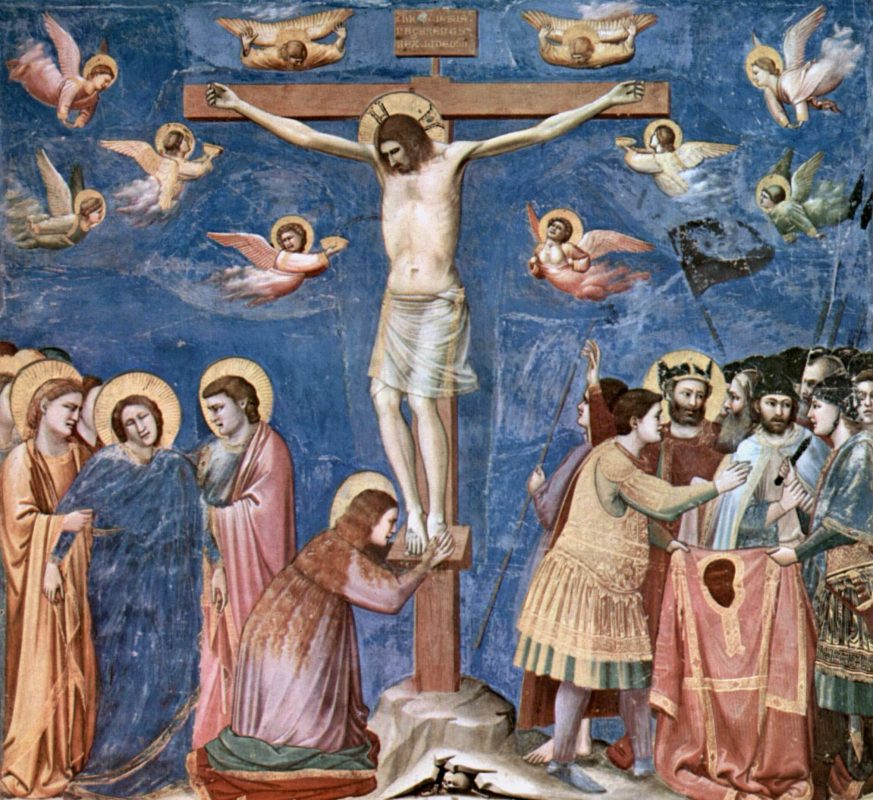
Let us not think it strange, my brothers, “that the whole world has been redeemed. He who was sacrificed for all was no mere man; he was the only begotten Son of God. And of course it was possible for the sin of one man, Adam, to bring death into the world. If then by the transgression of one death reigned in the world, how shall not by the righteousness of one life much more reign? And if then, because they ate of the tree of life, the firstborn were driven out of heaven, shall not those who believe enter heaven more easily, thanks to the Cross of Jesus? If he who was first formed from the dust brought universal death, will not he who formed him from the dust, being life itself, bring eternal life?”[4] Let us not, then, be ashamed of the Saviour’s Cross, but rather let us rejoice. Of course, according to the sublime Paul, the preaching of the Cross is a scandal to the Jews and foolishness to the pagans[5]; but for us it is Salvation, because the Crucifixion is succeeded by the Resurrection. According to our guide St. Cyril, “Many in all the world have been crucified, but none of them are feared by the demons. But of Christ, who was crucified for us, the demons tremble at the very sign of the Cross, for others died for their own sins, whereas Christ died for the sins of others.”[6] In the case of Christ, who was crucified for us, the demons tremble at the sign of the Cross alone. This truth is the orientation of the first prophecy of Isaiah that we will study:“for he did no sin, neither was guile found in his mouth”[7]. It is confirmed both by Pilate himself – who says “I find no cause in this man”[8] and “I am innocent by the blood of this righteous man”[9] – and by one of the two thieves, who, addressing his confined man, says reproachfully, “we deservedly enjoy the consequence of our deeds, but he has done no harm”[10]. Another prophecy is found in the New Testament, which follows the same rule: “all others who do not know the hour of their death, die unwillingly, whereas He spoke beforehand of the passion of“behold the Son of man is delivered unto the cross” (Matt. 26:2)-as it was. And do you know why the philanthropist did not avoid death? That the world might not perish for its sins”[11]. In the flow of his discourse, St. Cyril focuses on another prophecy of exhortation: “Read the Lamentations of Jeremiah, where the prophet, lamenting for the Jews, wrote of the deplorable state they were in. He saw their destruction, he envisioned their fall, and he lamented the Jerusalem of that day. For that Jerusalem crucified him. Mourning therefore he says: “He who gave us breath, that is, Christ the Lord, was caught in our filthy snares” (Lamentations. 4:20). Is what I say my own words?-continues the wise Cyril. Here is the prophet testifying that Christ the Lord is apprehended by men. But tell me, my prophet, what will be the result of this? And he says: “We had said, that under his shadow we shall live among the Gentiles” (Lamentations 4:20). He implies that henceforth the grace of Christ will not be given to the Israelite people, but to the Gentiles”[12]. Another lesson for the new converts of our day is the universality of the sacrifice of the Messiah, who was crucified not only for the Jews or the Greeks, but for all nations.
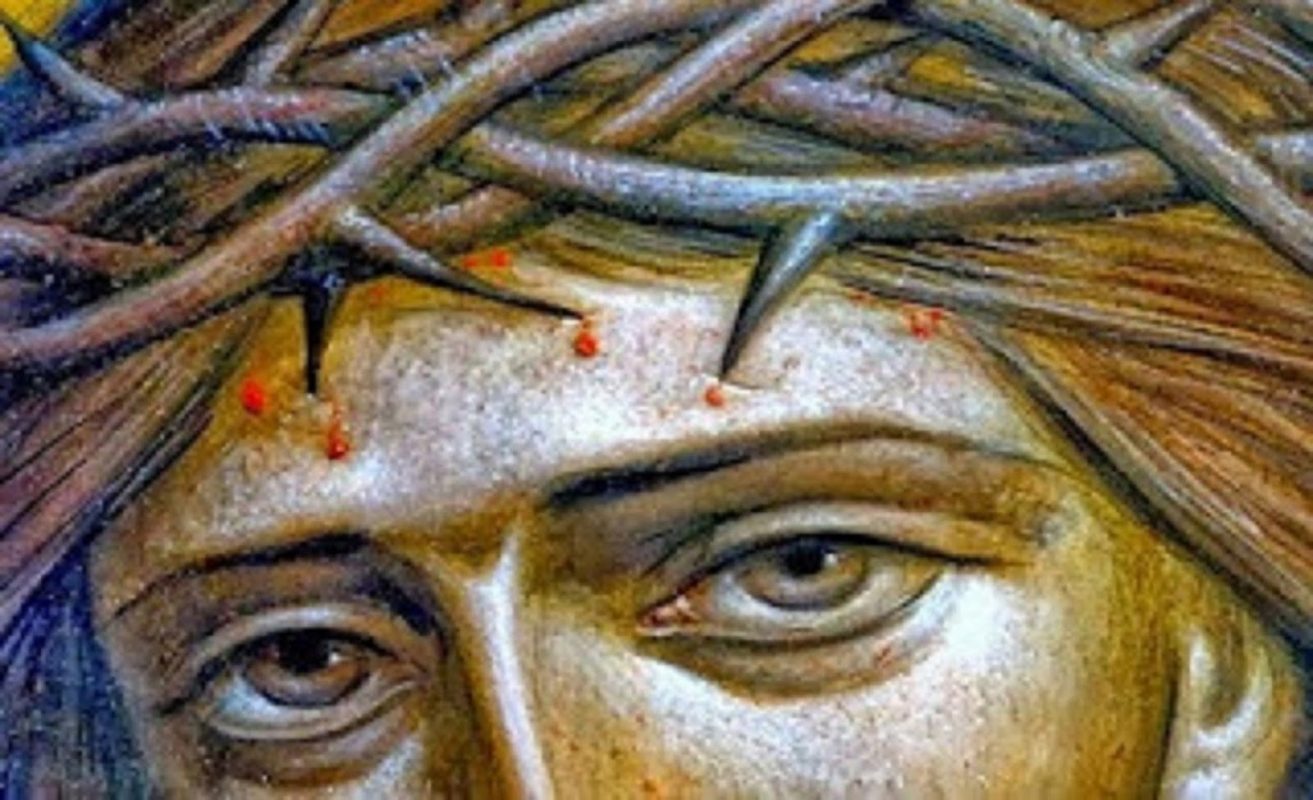
At the same time, the Book of Psalms is full of Christological prophecies, the most representative of which the Saint has listed for the event of the sacrifice of the God-Man. “Judas was the betrayer, who went and stood against him, speaking peaceably, while in himself he prepared war. So it is said of him by the Psalmist ” my friends and my neighbours for my sake have spoken and stood against me” (Ps. 37:12), and even ” their words have been madesoft for oil, and they ticketed bullets” (Ps. 54:22). Translated, ” my friends and those who were near me have come and stood against me,” and ” their words were made soft, more than oil, and yet they were true arrows.” “Hail, Master,” and he delivered his Master to death. Did he not respect the reminder of him who said to him, “Judas, by kissing thou deliverest up the Son of man?” (Lk. 22:48) It was as if he were saying to him; remember your name, for Judas means confession. You agreed, you got the silverware, confess quickly. Listen still to the psalmist prophesying ” O my God, despise not my praise, because the mouth of a sinner and the mouth of a deceitful man is opened against me. They have spoken against me with a deceitful tongue, and have surrounded me with words of hatred ” (Psalm 108:13). That some of the chief priests were present and that the guards were at the gates of the city we know, but there is also the psalm that foretells the time and place of Jesus’ arrest-“they returned at evening, and were filled as dogs, andcompassed the city” (Ps. 58:7,15)”[13]. Shocking, too, is the prophet Zechariah’s prediction of the thirty pieces of silver. “And they set up my wages thirty pieces of silver“[14] causing the Holy One to exclaim: “How true prophetic accuracy! What great prudence of infallible Holy Spirit! For he said not ten, nor twenty, but exactly thirty and all that was. And he goes on-but thou, my prophet, and whither this price comes. Does he who takes it keep it, or does he return it? And after the return, where does it go? So the prophet says, “And they took the thirty pieces of silver, and put them into the crucible of the temple of the Lord” (Zech. 11:13). Now compare the prophecy with the Gospel, for it says, “Judas repented, and cast the pieces of silver into the temple, and departed” (Matt. 27:10)”[15]. Luke informs us that “they bound Jesus and led him into the court of the high priest” (Lk. 22:54) while hundreds of years before Isaiah writes: “Let us say to the righteous, that he is of no profit to us” (Isa. 3:9-10) and “this Lord will come to judgment after the elders of the people and after his princes”(Isa. 3:14), i.e., “this Lord will come to be judged by the elders and princes of the people.” Let us study, brethren, and the sequel, it is still more startling. John in his gospel tells us that when the high priest heard the truth, he was indignant, and the wicked servant gave him a spanking and spat on the face of the God-man[16] Isaiah had reported: “I gave even my jaws to be spit upon, and I did not turn my face to avoid the shame of spitting“[17]. Mark in turn informs us that Pilate, after scourging Jesus, handed him over to be crucified[18] and Isaiah – as the fifth evangelist – had said: “I let my back be scourged“[19]. In addition, there are other references that confirm the divine and infallible origin of the prophecies. The Lord was led bound by Caiaphas to Pilate.
I wonder if this has been written too? “And when they had bound him, they led him as a token of friendship to King Jareim“[20] Isaiah prophesies. But some of us might notice that Pilate was not a king. So how did they bind Him and send Him as a token of friendship to the king? And yet, Luke confirms, “when Pilate heard that He was a native of Galilee, he sent Him back to Herod, who was then king”[21] and was in attendance at Jerusalem. Remarkable, on this point, is the accuracy of the prophet; he says that he sent Jesus as a means of reconciliation. “And indeed Pilate and Herod became friends indeed that day with one another, whereas before they were enemies”[22], according to the Evangelist Luke. For – as St. Cyril interprets – “He who was to reconcile earth and heaven, had first to reconcile His own judges”[23]. From this remarkable prophecy we draw a beautiful conclusion both for the “Christian society” in which we live and especially for the long-suffering African continent, which is plagued by divisions and civil wars. A true Christian is the one who does not cause discord, he is the man of peace, the one who loses his own right for the benefit of his brother, just as Jesus did. He without fault in anything – being sinless – went up to the cross for the salvation of us all.
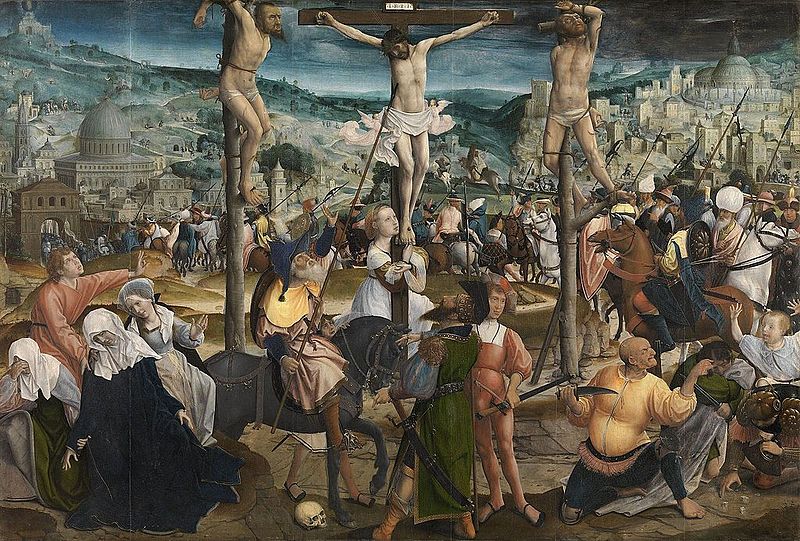
“Aron Aron crucifyhim“[24] recalls the words of Jeremiah, who speaks on behalf of Christ: “my people became to me like a lion in the forest, they roared against me“[25]. The attitude of the soldiers who surrounded and mocked the Lord confirms the psalm “they saw me and shook their heads against me“[26]. It is further worthwhile to consider some prefigurations of the Cross in the Old Testament. “This type of the Cross was modeled by Moses in crucifying the serpent, so that whoever was bitten by the living serpent, looking to the bronze serpent, would be saved by faith (Num 21:9). Well, then – points out Archbishop Cyril, Archbishop of Jerusalem – the bronze serpent hanging saves, and the Son of God, who also became man, crucified does not save? Life has always been associated with wood. In Noah’s time with the wooden ark life was saved. Again in Moses’ day the sea, seeing the type of the rod, feared the one who struck it (Ex. 14:21 and 27). So then the rod of Moses has power, and the cross of the Savior has not?”[27]. However, we also have shocking prophecies about the events of the time of the crucifixion. The Lord was crucified, according to Mark’s testimony, at the third hour[28] and from the sixth to the ninth it was darkness. From the ninth hour onwards there was light again.
[29]. And the Saint asks rhetorically, “Are these also written? And he mentions the prophecy of Zechariah: ” in that day there will be no light” and even “the Lord knew that day, and it was neither day nor night.”[30]. And St. Cyril insists on his evidentiary rant : “But do you ask to know clearly what time the sun was lost? Was it the fifth hour, or the eighth, or the tenth? Tell, my prophet, exactly the hour to the unbelieving Jews. When did the sun go down? Thus saith the prophet Amos; “It shall come to pass in that day, saith the Lord God, that the sun shall go down at noon (indeed from the sixth hour it was dark) (Matt. 27:45), and the light shall be darkened upon the earth while it is day (Zech. 14:7).” What season will this be, my prophet, and what day? “And I will turn your feasts into mourning” (Amos 8:10), for the crucifixion took place in the time of unleavened bread and the feast of Passover. And further on it says; “And he shall be a beloved person to them that mourn, and to them that are with him shall be a day of mourning (Amos 8:10).” For it was a day of unleavened bread and a feast, in which their women mourned and wept (Lk 23:27), while the Apostles hid themselves in pain. The prophecy therefore is worthy of admiration”[31]. We even have a verified prophecy about Jesus’ clothing. John informs us that the soldiers distributed the garment after tearing it into four. But they did not tear the robe, for if it were torn it would be of no use, but a lottery was held among the soldiers[32]. The said psalm is thus fulfilled: “they have divided my garments for themselves, and have put a lottery upon my garment“[33]. “We also know that when he was tried by Pilate he wore red, for Matthew says “they were put on him with red robes” (Matt. 27:28). I wonder if this was also written? Isaiah reveals: ”
Who is the one who came from Idumea? From the city of Bosporus in red robes? Why are your clothes red, and your garments as if you came from a grape press? “And he answers, “All day long I have stretched out my hands to a disobedient and disobedient people” (Is 63:1-2) [34]. In conclusion, brothers and sisters, we note the last prophecy that brings out the extremity of the malice of us humans, the extent of our ingratitude in the face of our Benefactor. “Thirst” pronounced the Divine lips to His crucifiers, and they, instead of respecting His beneficent presence on earth, or at least the human unbearable pain of death which He felt, watered Him with vinegar. Yes, it is true that this is also prophesied by the Psalmist, who states “And they put gall on my breast, and on my belly they poured vinegar“[35].
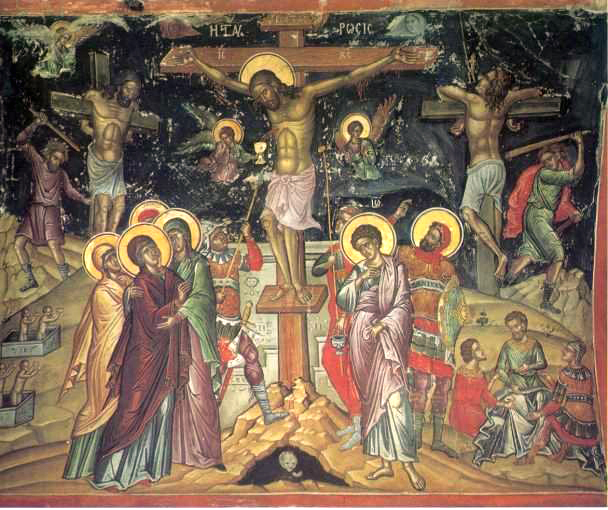
Brother Christian, the Saint advises, “take up arms against the enemies to defend this Cross. Make a trophy of the faith of the Cross against those who oppose it. And when you are to discuss the Cross of Christ with unbelievers, before you begin, form with your hand the sign of the Cross of Christ towards them, and he who opposes will be apostatized. Do not be ashamed to confess the Cross. For even the angels boast, saying, We know whom you seek Jesus crucified (Matt. 28:5). Can you not say, angel, I know whom you seek my own Saviour? But I, he says with boldness, know the Crucified One. For the Cross is glory and not dishonor”[36]. “But let us return to the proof we have received from the prophetic proofs. The Lord was crucified, we have heard all the testimonies. We see the place of Calvary. We recite praises in agreement. Let us beware lest in a time of persecution we deny Him. Let us not only rejoice in the Cross in times of peace, but in times of persecution let us have the same faith. Let us not be friends of Christ in time of peace, and become enemies in time of war. Now we receive forgiveness of our sins and the gifts of the King’s spiritual gift. When war comes, fight bravely for your King. The sinless Jesus was crucified for you, my brother and sister, and are you not crucified for him who was crucified for your sake?”
[37].
Baptized, converted and indoctrinated, let us strive against our passions as a response to the sacrifice of the God-Man on the cross. Do you, my brother, desire pleasure? Look at the pain of the cross. Do you crave ambition? Behold the humiliation of the Cross. Do you desire the abundance of money? Behold the poverty of the Cross. Do you covet the mission? Climb upon the Cross that leads undoubtedly to the riches of the Resurrection!
Amen.
[1] Meletios Metropolitos, What is Christ, ed. “I.M.Nicopolis”, Preveza 1999.
[2] John Chrysostom, Isaiah, H.P.E. Thessaloniki 1983, 8, 442-446.
[3] Cyril of Jerusalem, Catechisms, “To Byzantium”, vol. 2, Thessaloniki 1994, pp. 11-13.
[4] Cyril of Jerusalem, Catechisms, “To Byzantium”, vol. 2, Thessaloniki 1994, p. 13.
[5] 1 Cor. 1, 18-23.
[6] Cyril of Jerusalem, Catechisms, “To Byzantion”, vol. 2, Thessaloniki 1994, p. 15.
[7] Is. 53, 9.
[8] Lk. 23, 14.
[9] Matt. 27, 24.
[10] Lk. 23, 41.
[11] Cyril of Jerusalem, Catechisms, “To Byzantium”, vol. 2, Thessaloniki 1994, p. 19.
[12] Cyril of Jerusalem, Catechisms, “To Byzantium”, vol. 2, Thessaloniki 1994, p. 21.
[13] Cyril of Jerusalem, Catechisms, “To Byzantion”, vol. 2, Thessaloniki 1994, pp. 25-27.
[14] Zech. 11,12.
[15] Cyril of Jerusalem, Catechisms, “To Byzantion”, vol. 2, Thessaloniki 1994, p. 27.
[16] Jo. 18,22.
[17] Is. 50.6.
[18] Mark. 15,15.
[19] Is. 52, 6.
[20] Hosea. 10, 7.
[21] Lk. 6, 7.
[22] Lk. 23, 12.
[23] Cyril of Jerusalem, Catechisms, “To Byzantium”, vol. 2, Thessaloniki 1994, p. 33.
[24] Jo. 19, 15.
[25] Jer. 12, 18.
[26] Psalm 108:25.
[27] Cyril of Jerusalem, Catechisms, “To Byzantion”, vol. 2, Thessaloniki 1994, pp. 39-41.
[28] Mark. 15, 25.
[29] Matt. 27, 45.
[30] Zech.14, 7.
[31] Cyril of Jerusalem, Catechisms, “To Byzantion”, vol. 2, Thessaloniki 1994, pp. 47-49.
[32] Jo. 19, 23-24.
[33] Psalm 21:14.
[34] Cyril of Jerusalem, Catechisms, “To Byzantion”, vol. 2, Thessaloniki 1994, p. 49.
[35] Psalm 68:22.
[36] Cyril of Jerusalem, Catechisms, “To Byzantion”, vol. 2, Thessaloniki 1994, p. 43.
[37] Cyril of Jerusalem, Catechisms, “To Byzantion”, vol. 2, Thessaloniki 1994, pp. 43-45.


